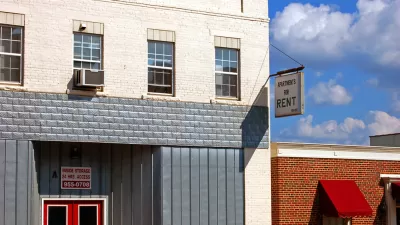Across the Intermountain West, paper plats and half-completed subdivisions are straining budgets and threatening the quality of life. A new report from the Lincoln Institute of Land Policy identifies treatment and prevention measures.

“'Zombie subdivisions' – the living dead of the real estate market – can be reconfigured for more open space or turned over to other uses, but the far better policy is to prevent the phenomenon in the first place, say Jim Holway, Don Elliott, and Anna Trentadue, authors of Arrested Developments: Combating Zombie Subdivisions and Other Excess Entitlements, the Lincoln Institute’s latest Policy Focus Report, available for free downloading."
In such states as Idaho, Montana, Wyoming and Arizona, the legacy of the housing boom and bust is written across "millions of 'entitled' empty lots" located in vacant and partially-built subdivisions. "The incomplete developments—also known as 'excess entitlements' that were granted by local governments, and some of which exist only on paper —are a burden on natural resources, hurt property values, and impose fiscal strains, requiring road maintenance, infrastructure, and obligatory emergency services coverage – all without contributing to the local tax base."
Following a thorough examination of the problem using data analysis, case studies, and survey results, the authors offer policy recommendations and best practices for addressing and avoiding zombie subdivisions.
FULL STORY: Confronting zombie subdivisions

Coming Soon to Ohio: The Largest Agrivoltaic Farm in the US
The ambitious 6,000-acre project will combine an 800-watt solar farm with crop and livestock production.

Pennsylvania Mall Conversion Bill Passes House
If passed, the bill would promote the adaptive reuse of defunct commercial buildings.

U.S. Supreme Court: California's Impact Fees May Violate Takings Clause
A California property owner took El Dorado County to state court after paying a traffic impact fee he felt was exorbitant. He lost in trial court, appellate court, and the California Supreme Court denied review. Then the U.S. Supreme Court acted.

Dallas Surburb Bans New Airbnbs
Plano’s city council banned all new permits for short-term rentals as concerns about their impacts on housing costs grow.

Divvy Introduces E-Bike Charging Docks
New, circular docks let e-bikes charge at stations, eliminating the need for frequent battery swaps.

How Freeway Projects Impact Climate Resilience
In addition to displacement and public health impacts, highway expansions can also make communities less resilient to flooding and other climate-related disasters.
City of Costa Mesa
Licking County
Barrett Planning Group LLC
HUD's Office of Policy Development and Research
Mpact Transit + Community
HUD's Office of Policy Development and Research
Tufts University, Department of Urban and Environmental Policy & Planning
City of Universal City TX
ULI Northwest Arkansas
Urban Design for Planners 1: Software Tools
This six-course series explores essential urban design concepts using open source software and equips planners with the tools they need to participate fully in the urban design process.
Planning for Universal Design
Learn the tools for implementing Universal Design in planning regulations.

























